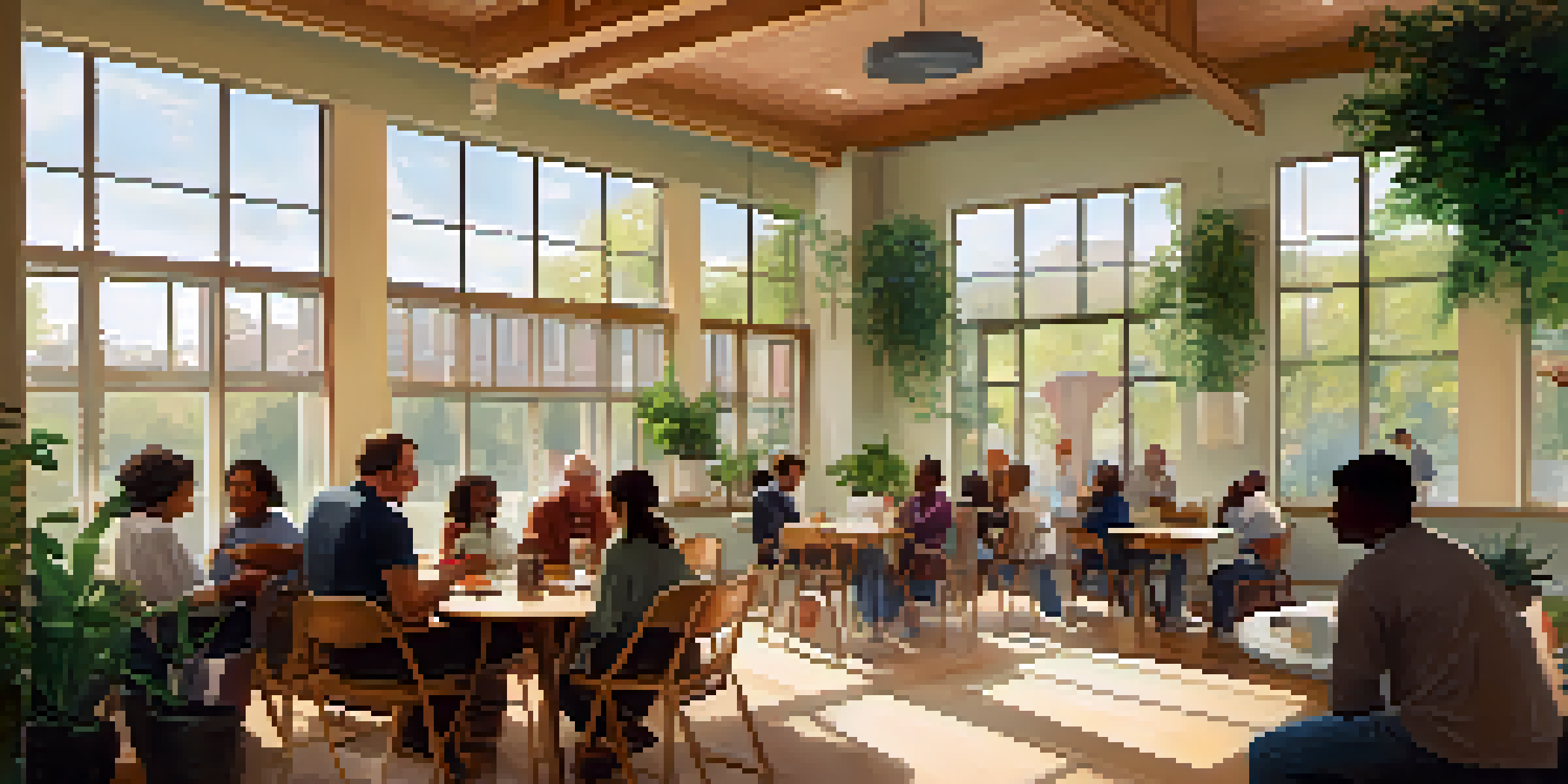Mental Health Resources: Community Support for Well-Being

Understanding Mental Health and Community Support
Mental health is an essential aspect of our overall well-being, yet it often gets overlooked. Community support plays a vital role in ensuring individuals have the resources they need to maintain their mental health. This support can come in various forms, including counseling services, peer support groups, and local workshops.
Mental health is not a destination, but a process. It's about how you drive, not where you're going.
When we talk about community support, we mean the collective efforts of individuals and organizations that foster a safe environment for everyone. Imagine a neighborhood where people come together to share their experiences and challenges—this creates a powerful network of understanding and assistance. It’s a reminder that no one has to navigate their mental health journey alone.
As we delve deeper into the resources available, it’s crucial to recognize how these community initiatives can improve our mental health. They not only provide immediate help but also empower individuals to build resilience and cultivate a sense of belonging. Together, we can create a supportive landscape that nurtures mental well-being.
Local Mental Health Hotlines and Their Importance
One of the most accessible resources for mental health support is local hotlines. These services offer immediate assistance and guidance, often 24/7, ensuring that someone is available to listen and help. For instance, if you're feeling overwhelmed or in crisis, calling a hotline can be a comforting first step.

Hotlines provide a safe space where individuals can express their feelings without judgment. Trained professionals or volunteers are on the other end, ready to offer support and resources tailored to your needs. This immediate connection can make a significant difference, especially when someone feels isolated or unsure of where to turn.
Community Support Enhances Well-Being
Community support provides essential resources and connections that help individuals maintain and improve their mental health.
Furthermore, hotlines often serve as a gateway to other mental health resources in the community. Whether it’s connecting you to therapy options or local support groups, these services can guide you toward a path of healing and recovery. Knowing that help is just a phone call away can alleviate some of the stress and anxiety surrounding mental health issues.
Peer Support Groups: Sharing Experiences Together
Peer support groups provide a unique environment where individuals can share their experiences with others who understand what they’re going through. These groups create a sense of community and belonging, breaking down the barriers of isolation often felt by those struggling with mental health. Imagine sitting in a circle, sharing your story, and hearing others echo your feelings—it can be incredibly validating.
The greatest discovery of my generation is that a human being can alter his life by altering his attitude.
These groups can vary in focus, from general mental health support to specific issues like anxiety or depression. They are often facilitated by trained peers who have lived experience, ensuring that the environment is both supportive and empathetic. This shared connection fosters open dialogue, allowing participants to learn from one another and develop coping strategies together.
Moreover, peer support groups can encourage accountability and motivation. When you see others working toward their mental health goals, it can inspire you to take similar steps in your own life. This camaraderie can be a powerful tool in recovery, reminding everyone that they are not alone in their struggles.
Therapy and Counseling Services in Your Community
Therapy and counseling services are crucial components of mental health support, offering individuals the chance to explore their feelings in a safe, professional environment. Many communities provide access to licensed therapists who specialize in various issues, from trauma to relationship challenges. This can be an invaluable resource for anyone seeking to improve their mental health.
It’s important to remember that therapy isn’t one-size-fits-all; different approaches work for different people. Some might thrive in a traditional talk therapy setting, while others may benefit from more hands-on techniques like art or music therapy. Finding the right fit can make all the difference in your experience and progress.
Hotlines Offer Immediate Assistance
Local mental health hotlines provide 24/7 support, offering a safe space for individuals in crisis to seek help and guidance.
Community centers often provide sliding scale fees or even free counseling services, making therapy accessible to everyone. This is especially important for individuals who may not have the financial means for private therapy. By removing these barriers, communities can ensure that mental health support is available to all, promoting overall well-being.
Workshops and Educational Events for Mental Health Awareness
Workshops and educational events are fantastic ways to learn more about mental health and connect with others in your community. These gatherings often cover a range of topics, from stress management techniques to understanding mental illnesses. By attending these events, individuals can gain valuable insights and tools to help enhance their mental well-being.
In addition to education, workshops often provide a space for individuals to share their experiences and connect with like-minded people. This can foster a sense of camaraderie and support, allowing attendees to build relationships that extend beyond the workshop itself. It’s a reminder that mental health is not just an individual journey; it’s a community effort.
Moreover, these events often feature mental health professionals who can offer guidance and answer questions. This direct access to expertise can empower individuals to take proactive steps in their mental health journey. By participating in workshops, you not only enhance your understanding but also contribute to a culture of awareness and acceptance.
Online Resources and Support Groups for Accessibility
In today’s digital age, online resources have become increasingly important for mental health support. Websites, forums, and social media groups offer a wealth of information and community connection that can be accessed from anywhere. This is particularly beneficial for individuals who may find it challenging to attend in-person support groups or therapy sessions.
Online support groups provide a platform for people to share their experiences and seek advice without the pressure of face-to-face interactions. This anonymity can encourage more open discussions, allowing individuals to express themselves freely. It’s a great way to connect with others who understand your struggles, regardless of geographic location.
Workshops Foster Mental Health Awareness
Educational workshops and events create opportunities for individuals to learn about mental health and connect with others in their community.
Additionally, many organizations offer virtual workshops and webinars, making mental health education more accessible than ever. Whether you’re looking for coping strategies or simply want to learn more about mental health topics, the internet has a plethora of options. This flexibility ensures that everyone can find the support they need, on their terms.
The Role of Community Centers in Mental Health Support
Community centers often serve as the heart of local support initiatives, offering a range of mental health resources. From hosting support groups to providing counseling services, these centers play a pivotal role in promoting mental well-being. They create a welcoming environment where individuals can seek help and connect with others.
Many community centers also collaborate with local organizations to provide comprehensive mental health programs. This can include workshops, health fairs, and outreach initiatives that raise awareness about mental health issues. By working together, these organizations can create a more robust support network for individuals in need.

Moreover, community centers often focus on inclusivity, ensuring that resources are available to diverse populations. This commitment to accessibility helps to break down barriers and encourages individuals from all backgrounds to seek help. By fostering an inclusive environment, community centers can significantly impact mental health within their localities.
Taking the First Step Towards Seeking Support
Recognizing the need for support is often the hardest part of the journey, but taking that first step can lead to significant improvements in your mental health. Whether it’s reaching out to a friend, calling a hotline, or visiting a community center, acknowledging your feelings is a courageous act. Remember, seeking help is not a sign of weakness; it’s a testament to your strength and resilience.
Once you decide to seek support, explore the various resources available in your community. From peer support groups to therapy options, there are many avenues to explore that can cater to your specific needs. Take your time to find what feels right for you, and don't hesitate to try different approaches until you find the one that resonates.
Lastly, remind yourself that you are not alone in this journey. Many individuals share similar struggles, and communities are filled with people eager to support one another. By taking that first step and seeking community support, you open the door to healing and connection, setting the stage for a brighter tomorrow.